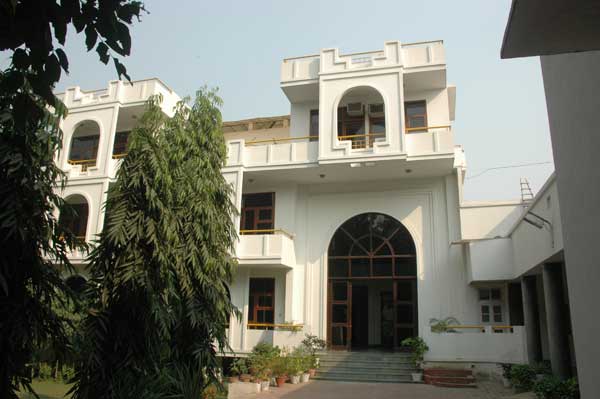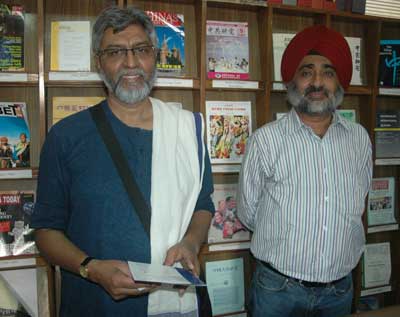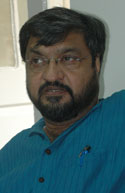SWEDISH SOUTH ASIAN STUDIES NETWORK
Visit to the Centre for the Study of Developing Societies (CSDS), New Delhi, November 2, 2007
Web page: http://www.csdsdelhi.org/
 From the Institute of Social Sciences (ISS) we took a taxi through New Delhi to the other part of the town (a trip of more than an hour) to visit the Centre for the Study of Developing Societies (CSDS), a government-funded research institute back in 1964.
From the Institute of Social Sciences (ISS) we took a taxi through New Delhi to the other part of the town (a trip of more than an hour) to visit the Centre for the Study of Developing Societies (CSDS), a government-funded research institute back in 1964.
CSDS
is one of India's best-known independent research institutes.
Bringing together some of South Asia's most distinguished thinkers and writers, the CSDS has played an important part in shaping the intellectual and creative map of South Asia. Among the most well-known people around are Prof. Ashish Nandy (political psychologist and sociologist, Fellow at CSDS), Dr. Peter D’Souza (political scientist, Visiting Senior Fellow at CSDS), and Prof. Brij Tankha (Honorary Fellow and Coordinator for the East Asia Programme, Institute of Chinese Studies within CSDS).
 CSDS is also responsible for Sarai –the New Media Initiative, a CSDS program dedicated to exploring new technologies in South Asia. Sarai has set up a public access space for the research and practice of digital media in Delhi, one of the first of its kind in the developing world. Among many other projects, the Sarai program includes a digital archive of urban culture, a cluster of public terminals with a specially designed interface, and a media lab, which provides a technological context for collaborations and creations by artists and others.
CSDS is also responsible for Sarai –the New Media Initiative, a CSDS program dedicated to exploring new technologies in South Asia. Sarai has set up a public access space for the research and practice of digital media in Delhi, one of the first of its kind in the developing world. Among many other projects, the Sarai program includes a digital archive of urban culture, a cluster of public terminals with a specially designed interface, and a media lab, which provides a technological context for collaborations and creations by artists and others.
 |
| Rajeev Bhargava and Arvinder Singh in the well-equipped CSDS library. |
At CSDS, we were first met by Dr. Arvinder Singh, Head of the Economic Research Unit within the Institute of Chinese Studies (part of the CSDS). He is engaged in researching contemporary issues in the Chinese economy and Sino-Indian comparative issues including bilateral economic relations between the two countries.
We were then introduced to Prof. Rajeev Bhargava, Director of the Advanced programme of social and political theory at CSDS.
Prof. Bhargava is also connected to the Dept. of Political Science at the University of Delhi and a prominent scholar of multiculturalism and secularism in non-Western societies.
Bhargava has held fellowships in the Harvard University Program in Ethics and the Professions, at the British Academy. Besides, he is the South Asia Editor of openDemocracy website.
 We also met Dr. Aditya Nigam, a political scientist and Fellow at CSDS (photo to the left), who in 2006 published a book on ”The Insurrection of Little Selves: The Crisis of Secular-Nationalism in India”, exploring the crisis that secular-nationalism went through with the emergence of what is loosely called identity politics. With the rise of new political assertions on the one hand and sectarian tendencies on the other, the fundamentally Hindu assumptions of Nehruvian secular-nationalism were revealed. Dr. Nigam suggests that only by looking beyond the nation state can India conceive of a modern political community.
We also met Dr. Aditya Nigam, a political scientist and Fellow at CSDS (photo to the left), who in 2006 published a book on ”The Insurrection of Little Selves: The Crisis of Secular-Nationalism in India”, exploring the crisis that secular-nationalism went through with the emergence of what is loosely called identity politics. With the rise of new political assertions on the one hand and sectarian tendencies on the other, the fundamentally Hindu assumptions of Nehruvian secular-nationalism were revealed. Dr. Nigam suggests that only by looking beyond the nation state can India conceive of a modern political community.
Again, we were very well received and had a long luncheon meeting with these three researchers. Our impression was that the centre seems to be less related to activism than ISS, with researchers highly specialised in their academic fields. Nevertheless, one of their main activist responsibilities is to serve as advisers to the Ministry of Foreign Affairs and publish reports and periodicals about their work.
There are 27 similar government-funded research institutes under the Indian Council of Social Science Research (ICSSR) umbrella in India (see a SASNET list of the institutes). According to Dr. Singh, CSDS however differs from the others by being more interdisciplinary and less focused on economics alone. The four main areas of research at CSDS are China studies, Media studies and the social outcome of IT (SARAI), Comparative democracy, and Social and political theory.
CSDS has an extensive network of Indian and foreign scholars in these four fields. They encourage PhD students to become affiliated with CSDS, make use of their library facilities, and participate in seminars at the institute.
SASNET - Swedish South Asian Studies Network/Lund
University
Address: Scheelevägen 15 D, SE-223 70 Lund, Sweden
Phone: +46 46 222 73 40
Webmaster: Lars Eklund
Last updated
2008-05-22
